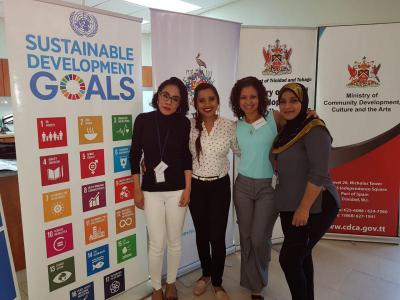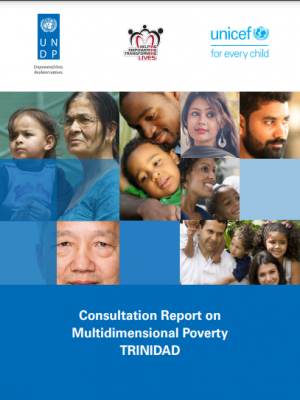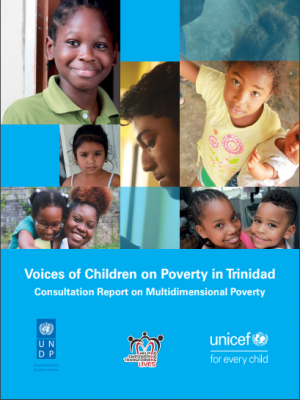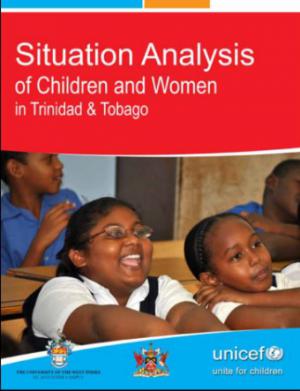Poverty
The HEU has collaborated with national, regional and international agencies to conduct research in various areas.

Featured Research
The Definition and Meaning of Poverty in Trinidad

A collaboration between The United Nations Development Programme (UNDP) in collaboration with the Ministry of Social Development and Family Services (MSDFS). This study included an analysis of living conditions and perceptions of poverty as experienced by persons in various communities throughout the 14 municipal regions in Trinidad. Focus Group Discussions (FGDs) were conducted in each of the 14 municipal regions in Trinidad in order to capture the voices of persons and gain insight into their definition and perception of poverty in their community and region.
National Report on Multidimensional Poverty in Trinidad Voices Report on Multidimensional Poverty in Trinidad
In addition to the above reports the following reports were produced:
- Consultation Report on Multidimensional Poverty. The Municipal Region of Port of Spain.
- Consultation Report on Multidimensional Poverty. The Municipal Region of San Fernando.
- Consultation Report on Multidimensional Poverty. The Municipal Region of Chaguanas.
- Consultation Report on Multidimensional Poverty. The Municipal Region of Arima.
- Consultation Report on Multidimensional Poverty. The Municipal Region of Point Fortin.
- Consultation Report on Multidimensional Poverty. The Municipal Region of Couva/Tabaquite/Talparo.
- Consultation Report on Multidimensional Poverty. The Municipal Region of Diego Martin.
- Consultation Report on Multidimensional Poverty. The Municipal Region of Penal/Debe.
- Consultation Report on Multidimensional Poverty. The Municipal Region of Princes Town.
- Consultation Report on Multidimensional Poverty. The Municipal Region of Rio Claro/Mayaro.
- Consultation Report on Multidimensional Poverty. The Municipal Region of San Juan/Laventille.
- Consultation Report on Multidimensional Poverty. The Municipal Region of Sangre Grande.
- Consultation Report on Multidimensional Poverty. The Municipal Region of Siparia.
- Consultation Report on Multidimensional Poverty. The Municipal Region of Tunapuna/Piarco.
The National Social Mitigation Plan: Building Resilience to Secure our Nation
 The HEU, Centre forHealth Economics was commissioned by the Ministry of Social Development and Family Services (MSDFS) to support the development of the National Social Mitigation Plan. The Plan outlines the strategies and actions to cushion the effects of the economic downturn on vulnerable groups and create opportunities for them to cope and recover in the short-term and to build the resilience of the citizenry in the long term. This Plan was approved by Cabinet in October 2017 and is currently used by the MSDFS to guide policies and decision making in the delivery of social services for Trinidad and Tobago.
The HEU, Centre forHealth Economics was commissioned by the Ministry of Social Development and Family Services (MSDFS) to support the development of the National Social Mitigation Plan. The Plan outlines the strategies and actions to cushion the effects of the economic downturn on vulnerable groups and create opportunities for them to cope and recover in the short-term and to build the resilience of the citizenry in the long term. This Plan was approved by Cabinet in October 2017 and is currently used by the MSDFS to guide policies and decision making in the delivery of social services for Trinidad and Tobago.
Situation Analysis of Children and Women in Trinidad and Tobago
This study sought to identify–to the greatest extent possible—the progress made by Trinidad and Tobago in the legal and policy framework of the Millennium Development Goals (MDGs), the Convention on the Rights of the Child (CRC) and the Convention on the Elimination of all forms of Discrimination Against Women (CEDAW). The project required extensive secondary data collection and the execution of surveys in Trinidad and Tobago at a range of facilities including children’s homes, health centres and primary and secondary schools.
Poverty and HIV/AIDS in the Caribbean
This project was funded by the World Bank. The project analysed the relationship between poverty and selected drivers of the HIV epidemic in two countries—Guyana (a low-income country with a high incidence of HIV/AIDS) and Trinidad and Tobago (a higher income country with a high incidence of HIV/AIDS).
Development Challenges of Health Epidemics in Small States: Focus on HIV/AIDS
A study of Countries in the Pacific, Southern Africa and the Caribbean. Commonwealth Secretariat, London. This study was done in collaboration with external colleagues and aimed to provide a detailed picture of the impact of the HIV/AIDS epidemic on by small developing countries in the Pacific, Southern Africa and the Caribbean. The study also assessed the responses of these countries highlighting key demographic issues, development impacts and possible opportunities for modernizationing social systems.
Health and Poverty in the Caribbean: An Analytical Review of Living Standards and Poverty Surveys (Six Countries)
This study was funded by the Caribbean Development Bank (CDB), Barbados and Pan American Health Organization (PAHO): Washington D.C. The study examined the relationship between poverty and health in the countries of Belize, Guyana, Jamaica, St. Lucia, St. Vincent and the Grenadines and Trinidad and Tobago. Data was analysed from Country Poverty Assessments and Living Standards Measurement Surveys to determine which variables influenced the health status of the poor and their access and utilisation of health services, identified gaps in the available data and provided health policy options for the mitigation of the health burdens of the poor. A Technical Report was produced from the study.









